- Home
- Gustave Aimard
The Indian Chief: The Story of a Revolution Page 8
The Indian Chief: The Story of a Revolution Read online
Page 8
CHAPTER VIII.
THE ENVOY.
The election over, all, in appearance, returned to the old routine, orat least seemed to re-assume its normal condition. Still it was not so.The Count de Lhorailles, in dying, had borne with him the hopes of theadventurers, whom he had only kept together through his resolute andenterprising character. With his fall, matters began to change, anddifficulties spring up.
The Mexican authorities, in whom the indomitable will of the count hadalone inspired an apparent kindness toward the colonists, whom theyhad never liked to see establish themselves on the territory of theRepublic, no longer apprehending the vengeance of the man they hadlearned to fear while learning to know him, very gently and craftilyinaugurated a system of minor annoyances, which was already beginning torender the position of the French difficult, and would soon cause it tobe intolerable, unless the latter employed an energetic remedy for thisstate of things, which grew hourly worse. On the other hand, though thecolony was so remote from the seaboard, rumours of what was going onin the rest of the world reached it at intervals. Emigrants in troopspassed through Guetzalli: all were proceeding to California, for thatwas the promised land at the moment.
All these emigrants--gambusinos, or Mexican adventurers--only dreamedof inexhaustible placers and mines of immense wealth. The goldfever--that horrible malady which the English so well stigmatised byenergetically calling it the "metallic gold fever"--was at its height.From all corners of the world, Europeans, Asiatics, Africans, Americans,Polynesians, adventurers of every description, settled like swarms ofill-omened locusts on this country, which was destined to prove fatal tothem, and swallow them up after unheard-of sufferings.
In this impious crusade of the vilest appetites the watchword was"Gold--gold!" These men, who abandoned country, family, everything, ina word, had only one desire--to amass gold. It was a hideous sight.And these bands succeeded each other at the colony, with their eyesobstinately fixed on the horizon, and only replying two words to thequestions asked them: "California--placers." In order to conquer thismetal king all means would be good to them: nothing would check them.They were ready for anything--to commit the most odious crimes, the mostinfamous treachery, the most ignoble acts of cowardice.
Unfortunately for the colonists, the adventurers who passed near theirabode all belonged to the most ignorant, corrupted, and ferociousclasses of Mexico. In spite of themselves, the Frenchmen, whose objecthad been, at the outset, to work the mines, felt the desire aroused inthem to return to the Eldorado they had left, and demand their shareof the spoil. A man, however strong he may be, cannot with impunityhear the word "gold" constantly buzzing in his ears. In the strangeconnection of these four letters there is an immense attractive power,which sharpens up avarice, and arouses all the evil instincts.
The colonists of Guetzalli were honest and frank adventurers. Themajority had quitted Europe with the desire of enriching themselvesrapidly in that mysterious country about which they heard such marvels.Subdued by the ascendency the count had managed to acquire over them,they had tacitly accepted the position made for them, and, by the aidof habit, had gradually come, not to forget their past desires, but toconsider them as mocking chimeras and unrealisable dreams. The eventswhich afterwards happened in the colony, and the golden halo suddenlyspread abroad by California, gave a body to these dreams, and enkindledtheir covetousness to the highest pitch.
Charles de Laville followed with a shudder the progress of this moraldisorganisation of the colony. He understood in his heart that the enemyhe must conquer, in order to become once more master of his companions,was that old adventurous leaven which still fomented in their hearts,and caused them to hate the calm and peaceful life they led, insteadof that agitated existence, with its strange interludes, to which theysecretly aspired, perhaps without suspecting it themselves. For it is asingular anomaly in the human heart that these men, who wished for goldat any price, who coveted it with unequalled frenzy, and who, to possessit, braved the most terrible perils, and suffered the most horriblemisery, did not care for it when they possessed it, but regarded it withdisdain, and threw it uncounted on the tables of the gambling houses,or of places still more infamous. It might be said that the gold sopainfully amassed burned their fingers, and they were anxious to get ridof it. And that was true, especially in the case of the French. Goldwith them had no value except in proportion to the difficulties they metwith in acquiring it. True adventurers in the fullest sense of the term,what they loved was not the gold for itself, but the struggles it costthem, and the energy and courage they must expend in its research.
Charles was thoroughly acquainted with the character of the men hecommanded He knew that, in order to keep them with him, it would besufficient to supply an outlet for this superabundance of sap, thisvivacity of imagination, which filled the hearts and heads of theseextraordinary men. But how to obtain this result? What means shouldhe employ? Charles racked his brains in vain: the spark did notstrike--there was no light he could throw on the matter.
About this time two Frenchmen, who had formed part of the count'slast expedition, and who were believed long ago dead, reappeared atGuetzalli. Great was the amazement of all on seeing them, although sohaggard, half naked, and scarce able to stand; but still greater grewthat amazement when, two days after their return, on finding themselvesslightly recovered, owing to the kind attentions shown them, and able tospeak, they commenced the incredible narrative of their adventures.
What had happened to them may be told in fewer words than the menemployed. The frightful hurricane that assailed the count's band hadsurprised them some distance from the spot where their companions hadtaken refuge, and rendered it impossible to rejoin them. They shelteredthemselves as well as they could during the tempest; but when it wasover, they perceived, to their horror, that every trace, every footmark,had disappeared.
Before them, behind them, and around them extended the desert, gloomy,naked, and desolate. As far as their eye could reach they perceivedon all sides sand---sand everywhere and always. Then they believedthemselves lost; despair took possession of them; and they fell back onthe ground, resolved to await death, which would doubtless soon arriveto put an end to their misery. They remained thus side by side, withdrooping heads and lacklustre eyes, in that state of complete apathywhich seizes on the strongest men after great catastrophes, suspends inthem the inward feeling of self, and interrupts their thoughts.
How long did they remain in this condition? They were unable to tell.They no longer lived, they no longer felt--they vegetated. They weresuddenly aroused from this extraordinary listlessness by the appearanceof a band of Apache Indians, who galloped round them, uttering ferociousyells, and brandishing their long lances with an air of defiance andmenace. The Indians seized them, as they were incapable of offering theslightest resistance, and led them to one of their villages, where theykept them in a state of the most disgraceful and humiliating slavery.
But the energy of the two adventurers, for an instant crushed, soongained the mastery again over their hearts. With extreme patience,skill, and dissimulation they made the preparations for their flight. Wewill not enter into any details as to the manner in which they succeededin escaping from the watchfulness of their guardians, and managed atlength to reach the colony by a roundabout road, crushed with fatigue,and half dead with hunger, but arrive at once at the most importantpoint in their narrative.
These men declared to the colonists that the village to which theApaches led them was built within gunshot of a placer of incalculablevalue--that this placer was extremely easy to work, as the gold was onthe surface. As a proof of their veracity they showed several nuggetsof the finest gold, which they had managed to secure, and pledgedthemselves to lead to this placer, which was not more than ten days'journey from the colony, any of the adventurers who would consent totake them as guides, assuring them that they would be amply rewarded fortheir toil and fatigue by the rich harvest they would obtain.
This recital greatl
y interested the colonists. Charles de Laville, inparticular, lent a lively attention to it. He made the men repeat theirstory several times, and they did not once vary from their originalstatement. The captain had at length found the means he had been vainlysearching so long. Now he was certain not only that his comrades wouldnot abandon him, but that they would obey him blindly in all that hethought proper to order them. The same day he informed the coloniststhat he was preparing an expedition to go in search of the placer,dislodge the Indians, and work it for the profit of all the paction.
The news was received with transports of joy, and de Laville immediatelybegan carrying out his plan. Although the number of colonists hadgreatly diminished (for frequent desertions had taken place), stillGuetzalli counted nearly two hundred colonists. It was of the utmostimportance to the gold-seekers to keep up the colony, as the only placewhence they could obtain provisions when at the mine; for, as we havesaid, Guetzalli, as the advanced post of civilisation, had been foundedon the extreme limit of the desert. This position, chosen originally inorder to oppose the Indians more effectually, and stop their periodicalincursions upon the Mexican territory, became precious in the presentinstance, through the facility it afforded the adventurers for supplyingthemselves with all they needed without having recourse to strangers;and this enabled them also to keep the discovery of the placer secret,at any rate long enough, owing to the distance of the _pueblos_ fromthe frontier, to render it impossible for the Mexican Government tointerpose and demand the lion's share, according to its usual custom.
The captain did not wish to strip the colony thoroughly, for he mustleave it in a respectable position, and safe from a sudden attack onthe part of the Apaches and Comanches, those implacable foes of thewhite men, ever on the watch, and ready to profit by their slightestoversight. De Laville therefore decided that the expedition shouldbe composed of eighty well-mounted and well-armed men, and that theothers should remain behind to protect the colony. Still, to avoid anydissension or jealousy among his comrades, the captain declared thatlots should decide who were to go in search of the placer.
This expedient, which rendered everybody equal, was warmly approved,and they proceeded to draw lots. The process was extremely simple: thename of each adventurer was written on a roll of paper and thrown intoa vessel, whence a boy drew them one by one. Of course the eighty namesthat came out first would be the members of the expedition. Thus, as thearrangement was most simple, and at the same time perfectly fair, no onehad a right to complain.
All was done as was agreed. Chance, as so frequently happens, favouredthe captain by selecting the most energetic and enterprising men.Then all eagerly prepared for the departure; that is to say, theycollected provisions of every description, got together mules, and madethe tools required for working the mine. Still, in spite of all theactivity displayed by the captain, nearly a month elapsed ere all was inreadiness.
The frightful catastrophe to which the Count de Lhorailles had fallena victim in the great Del Norte desert, which the adventurers wouldhave to cross in going to the placer, was a serious warning to deLaville to act with the utmost prudence, and leave nothing to chance.Hence, without listening in the slightest degree to the impatientinsinuations of his comrades, who urged him to press on the departureof the expedition, he watched with the most scrupulous attention theconstruction of the carts intended to convey the provisions, and allowedno detail, however trifling, to escape his careful eye; for he knew thatthe loss of an hour in the desert, produced by the breaking of a screw,a tire, or a trace, might cause the death of the men placed under hisorders.
At last all was ready, and the day for starting settled. Withinforty-eight hours the expedition would leave Guetzalli, when, at aboutfive in the evening, just as the captain, after giving a final glance atthe wagons already loaded and arranged in the courtyard, was about tore-enter his house, the sentry on the isthmus announced the arrival of astranger. As soon as the captain felt assured that it was a white man,and that he wore the uniform of a Mexican field officer, he ordered hisadmission to the colony. The barrier was at once raised, and the colonel(for he wore the insignia of that rank) entered Guetzalli, followed bytwo lanceros, who served as his escort, and a mule bearing his baggage.
The captain advanced to meet him. The colonel dismounted, threw thereins to a lancero, and bowed politely to the captain, who returned thesalute with equal courtesy.
"With whom have I the honour of speaking?" he asked the stranger.
"I am," the latter answered, "Colonel Vicente Suarez, aide-de-camp toGeneral Don Sebastian Guerrero, Governor-General of the province ofSonora."
"I am delighted, Senor Don Vicente, at the chance afforded me of makingjour acquaintance. You must be fatigued with the long journey you havehad to this place, so I trust you will not refuse to accept some modestrefreshment."
"I accept most gladly, caballero," the colonel answered with a bow; "themore so because I have ridden so fast that I have scarce rested a minutesince leaving Pitic."
"Ah! you come from Pitic?"
"As the bird flies. I have been only four days covering the ground."
"Hum! you must be terribly fatigued in that case, for it is a longdistance, and, as you did me the honour to inform me, you have travelledvery rapidly. Be kind enough to follow me."
The colonel bowed in reply, and the captain introduced him into a roomwhere refreshments of every description had been prepared.
"Sit down, Don Vicente," the captain said as he drew forward a chair.
The colonel fell back into the butaca offered him with a sigh ofsatisfaction, whose meaning only those who have ridden thirty leaguesat a stretch can understand. For some minutes the conversation betweenthe captain and his guest was interrupted, for the colonel ate anddrank with an avidity which, judging from the well-known sobriety of theMexicans, proved that he had fasted a long time. De Laville examined himthoughtfully, asking himself mentally what reason was so important as toinduce Don Guerrero to send a colonel to Guetzalli, and spite of himselfhe felt a vague uneasiness weighing on his heart. At length Don Vicentedrank a glass of water, wiped his mouth, and turned to the captain.
"A thousand pardons," he said, "for having behaved so unceremoniously toyou; but now I will confess to you that I was almost dead of inanition,having eaten nothing since eight o'clock last evening."
The captain bowed.
"You do not, of course, intend to return this evening?" he asked him.
"Pardon me, caballero, if it be possible, I shall start again in anhour."
"So soon?"
"The general ordered me to make the greatest speed."
"But your horses are half dead."
"I count on your kindness to supply me with fresh ones."
Horses were plentiful at the colony: there were more than the colonistscould use, and hence de Laville would have found no difficulty ingranting the colonel's request. Still his guest's manner seemed solittle natural, and he fancied he detected something so mysteriousabout him, that he felt his alarm increased, and said,--
"I do not know, colonel, whether, in spite of my lively desire to beagreeable to you, it will be possible for me to fulfil your request; forhorses are extremely scarce here at this moment."
The colonel made a sign of annoyance.
"_Caramba!_" he said, "that would vex me greatly."
At this moment a peon discreetly opened the door, and handed the captaina paper, on which a few words were written in pencil. The young man,after apologising, opened the paper and quickly read it.
"Oh!" he suddenly exclaimed, as he crumpled the paper in his hands withconsiderable agitation, "he here! What can be the matter?"
"Eh?" the colonel said curiously, who had not understood the meaning ofthis sentence spoken in French.
"Nothing," the other answered; "a mere personal matter." Then turning tothe peon, he said, "I am coming."
The peon bowed and left the room.
"Colonel," de Laville continued, addressing his guest, "pe
rmit me toleave you for an instant."
And without waiting for a reply he left the room hurriedly, closing thedoor carefully after him. This brusque departure totally discountenancedthe colonel.
"Oh!" he muttered, repeating in Spanish, though unconsciously, what thecaptain had said in French. "What can be the matter?"
As he was a true Mexican, fond of knowing everything, and, above all,of discovering anything people wished to keep secret from him, he rosegently, walked to the window, pulled the mosquito curtain aside, andlooked out curiously into the yard. But it was labour in vain: thecourtyard was deserted. He then returned on tiptoe to his seat, andbegan carelessly rolling a papelito, while muttering half aloud,--
"Patience! The man who knows how to wait always gains his end. I shallobtain the clue to this mystery sooner or later."
This aside having doubtlessly consoled him for the disappointment he hadexperienced, he philosophically lit his cigarette, and soon disappearedin the midst of a dense cloud of smoke which issued from his mouth andnostrils simultaneously. We will leave the worthy colonel enjoying thisamusement at his ease, and follow de Laville, in order to explain to thereader the meaning of the exclamation that escaped from him on readingthe paper which the peon so unexpectedly handed to him.

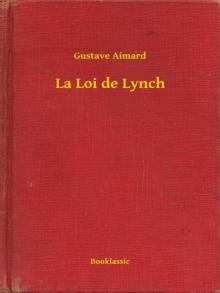 La loi de lynch. English
La loi de lynch. English The Guide of the Desert
The Guide of the Desert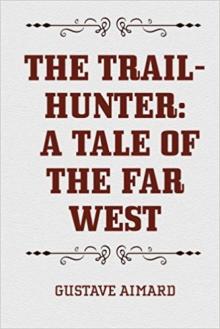 The Trail-Hunter: A Tale of the Far West
The Trail-Hunter: A Tale of the Far West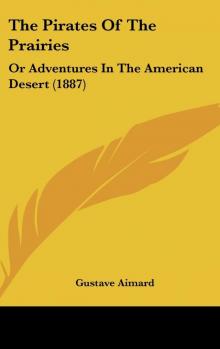 The Pirates of the Prairies: Adventures in the American Desert
The Pirates of the Prairies: Adventures in the American Desert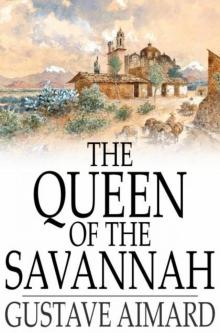 The Treasure of Pearls: A Romance of Adventures in California
The Treasure of Pearls: A Romance of Adventures in California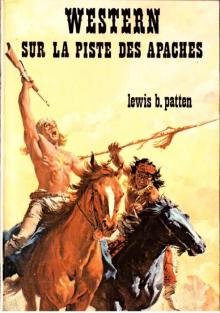 Les outlaws du Missouri. English
Les outlaws du Missouri. English Les trappeurs de l'Arkansas. English
Les trappeurs de l'Arkansas. English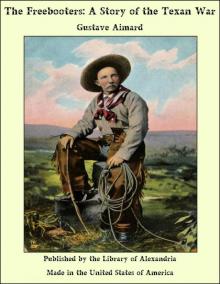 The Border Rifles: A Tale of the Texan War
The Border Rifles: A Tale of the Texan War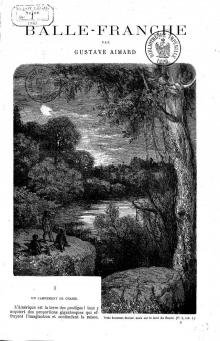 Balle-Franche. English
Balle-Franche. English The Queen of the Savannah: A Story of the Mexican War
The Queen of the Savannah: A Story of the Mexican War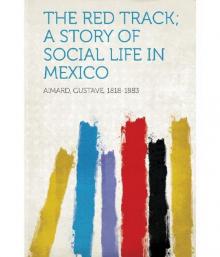 The Red Track: A Story of Social Life in Mexico
The Red Track: A Story of Social Life in Mexico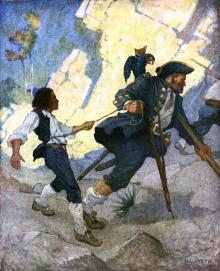 La fièvre d'or. English
La fièvre d'or. English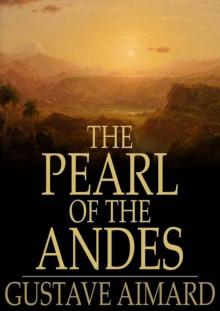 The Pearl of the Andes: A Tale of Love and Adventure
The Pearl of the Andes: A Tale of Love and Adventure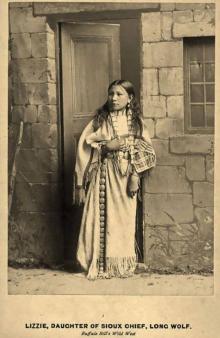 Les fils de la tortue. English
Les fils de la tortue. English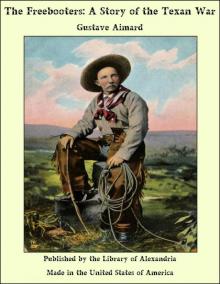 The Indian Chief: The Story of a Revolution
The Indian Chief: The Story of a Revolution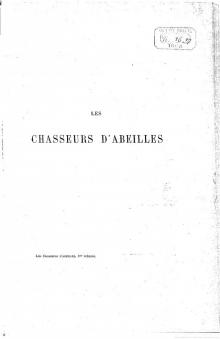 Les chasseurs d'abeilles. English
Les chasseurs d'abeilles. English The Adventurers
The Adventurers